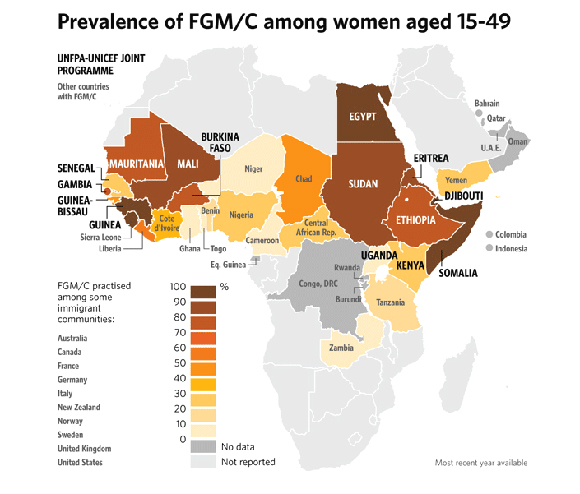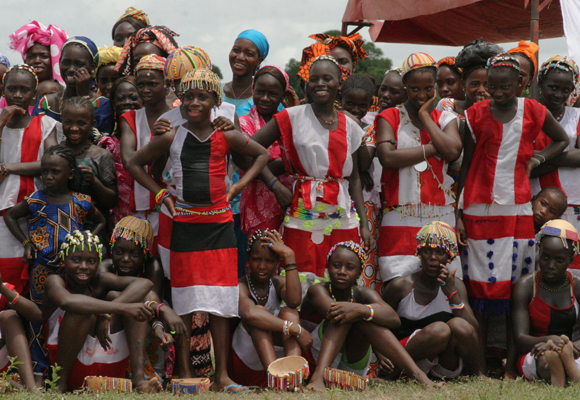Today is Human Rights day and the last of 16 days of activism to end violence against women.
Around 140 million women are living with the effects of Female Genital Mutilation/Cutting (FGM/C). In Africa alone, there are around three million girls who are undergoing the practice of FGM/C each year. This doesn’t even include the women and girls who are at risk in Asia, the Middle East, Latin America and from these communities in Western countries.

Some mothers are taking a strong stand against FGM/C. I have witnessed good examples of this in Senegal. Mariama, a 17-year-old born in Pata where FGM/C has been abandoned, is the mother of a two-year old girl and swears she would ‘never accept’ that her daughter would suffer as she did: “I had great difficulty at the time to have my first sex but also giving birth to my child.”
Khardiata, another young mother of an infant boy said: “I know I would not want my daughter to be circumcised if I had one.” However, she believes that going against the wishes of the elder in her village in Gambia, where FGM/C is still widely practised, would be difficult. She thinks her village should follow the example of Pata in Senegal. She believes that greater understanding of the dangers of the practice at all levels, especially among older generations, will bear fruit and that more communities will eventually end the traditional practice.

Encouraging countries to abandon the practice of FGM/C is what the UNFPA-UNICEF Joint Programme is seeking to achieve. Last week, the Female Genital Mutilation/Cutting Donor Working Group met at the Department for International Development (DFID) to discuss the issue of abandoning the practice.
I am very excited to see that DFID is strongly coming on board to encourage the end of FGM/C as this issue does not receive enough attention or funding and the needs are enormous.
DFID’s commitment to ending Female Genital Mutilation/Cutting and the speech from Development Minister Lynne Featherstone was very inspiring. As she asserted in her speech to the working group: “Too little is invested in this issue – too little money, too little research, too little attention.”
The lack of funding has been a challenge for the UNFPA-UNICEF Joint Programme on FGM/C. Out of the $44 million that was budgeted in 2007-2008 when the Joint Programme was launched, there still is a $16 million shortfall for the 2008-2013 programme cycle.
The Donor Working Group was a good opportunity to realise the challenges we have to face, such as the need to have more coordination in an environment of limited resources. Also, the lessons learnt from the Joint Programme teach us that it would be a good idea to use what we learnt to address other culturally sensitive programming, such as early marriage.
There is increasing momentum within Africa now to end the practice. Change is happening and is being led from within communities to parliaments. Now that a resolution on this issue is currently being discussed at the United Nations General Assembly - a positive sign that FGM/C issues are being pushed further up the global agenda - we have a real opportunity to act and end the practice.
I am very encouraged by the fact that UK aid will support the campaign to end FGM/C in one generation. There is an important role for Britain – and the rest of the international community – to support this momentum and work to end this damaging practice.

10 comments
Comment by Louis Glynn posted on
I appreciate that there may not be data available for South Sudan, however it should at least be shown on the map as a distinct nation. If the research was conducted before the split there should be a footnote stating this.
Comment by naturalfriend posted on
Great job sister..
Comment by Paula posted on
Thank you for your work and for giving us some good news. It will be a happy day when this practice is a thing of the past.
Comment by Raymond Ladebo posted on
Greetings:
This is to humbly bring to your attention the availability of my new novel -FLIGHT OF LIFE - from the trilogy- "phenomenon that refuses to die", a story from an African perspective which contributes to efforts to
bring about the eradication of female genital mutilation, the harmful traditional practice which is slowly becoming more global in its spread from Africa and the Middle East to the West through modern migration.
The novel is an advocacy styled fictional story of the adolescent daughter of an African diplomat who had first-hand knowledge of the agony of Female Genital Mutilation and the blood-chilling evidence of its damaging afflictions when she was seven years old. Avah has since had a predilection, and is averse to the harmful practice; she truculently battles to avoid going for the same rite of passage rituals. There was relentless pestering and harassing from family members fueling incessant heated confrontations between Avah and her mother including abduction attempts which finally culminated in sponsored daylight kidnapping on the streets of London and aggravated diplomatic imbroglio.
This insightful modern day story throws up some simple practical yet unique eradication tool(s) that are so far overlooked in the fight against the scourge of FGM. You are an acknowledged passionate believer in the erradication of the old harmful practice that leaves girls and women victims with life-long physical and psychological trauma.
Thank you for your kindness.
Raymond Ladebo
Comment by Hannah Koroma posted on
In Sierra Leone it goes beyond the cutting the practice has ritual connection that is why the operation is done in secluded places. The blood and the clitoris is use for ritual - that makes it very difficult for our campaign. Any matured and sensible woman and man knows it. They keep silence because all heads of the secret societies in this country are interrelated.
Secondly it is done purely for commercial purpose - parents/families pay heavy fee for a girl child to go through the process.
The politics today in Sierra Leone if a woman does not go through this process you either not get a party symbol (this for women in the provincial settings), they campaign against that woman that she has not gone through FGM/C process.
Our politicians are silent about it. They use the perpetrators in their campaigns and wouldn't want to lose their votes. The reason for this is that of high level of illiteracy in our sierra Leonean communities.
We have focus our campaign on "NO TO CHILD BONDO (FGM/C"
Just yesterday I did an hour power point presentation on the ROLES OF RELIGIOUS LEADERS WITH THE FIGHT AGAINST GENDER-BASED VIOLENCE AND FGM/C IN RELATION TO HIV&AIDS.
I am a survivor of FGM/C - I know what I went through and what I am still suffering from that barbaric practice.
Raymond don't give up. We all fighting against this practice.
Bravo to us all that are on this campaign wagon.
Hannah Koroma
Sierra Leone
Comment by Hannah Koroma posted on
The practice here in Sierra Leone is from the age of 5-18
Hannah Koroma
Comment by AMBROSE posted on
Together we can end violence, degrading and inhuman treatment against women across the global. Our success can be measured when women voice are heard and seen in most male chauvinist societies across the globe, Nigeria not excluded
Comment by Amanda E posted on
The time is now for the Department of Education to debate on FGM training for teachers. U.K residents may like to sign the petition.
http://submissions.epetitions.direct.gov.uk/petitions/47004
Comment by Hafifa M. Sheikh posted on
Hi. Greetings. Am a Somali lady in Nairobi and am saddened by the number of girls who face the knife every year, or every school holidays. It is rampant and happening everywhere.
We are educating the young ones and this is the only way we can get rid of this inhumane practice.
A lot of awareness for the young ones to say no to FGM, cause their mothers say, if it has been done to us then so be it.
Comment by maliven phorpana posted on
This inhmane practice suht b stop by fos if nessry.